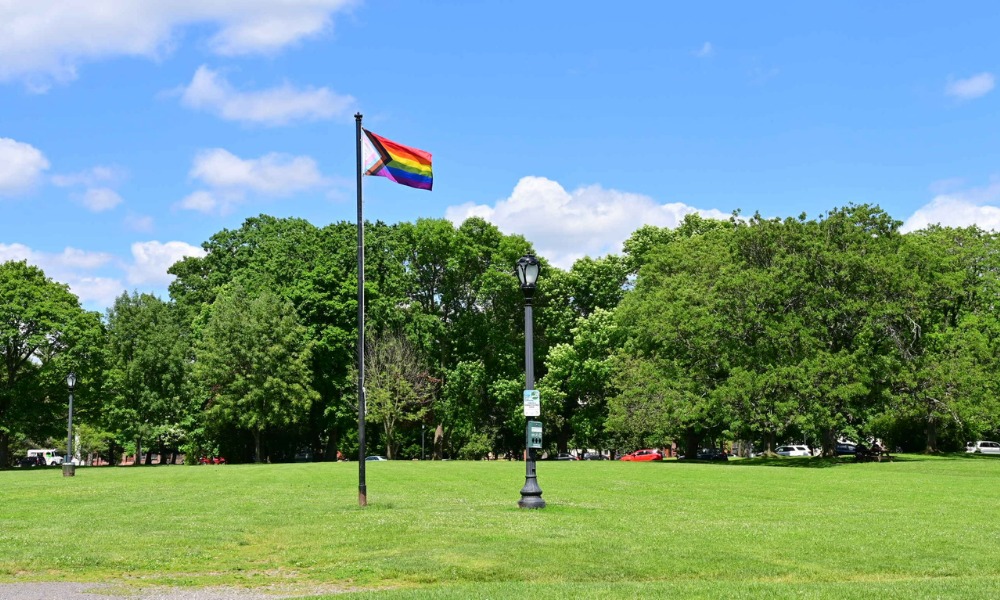
School board, citing policy supporting human rights law, denies proposed presentation

A school board denied a request for a proposed presentation covering the topic of flying the rainbow gay pride flag at all Ontario schools during Pride Month because it would contradict the laws, by-laws, and binding policies promoting inclusiveness, a recent ruling found.
The applicant asked the Bluewater District School Board to let her speak at a May 2019 school board meeting on “an Ontario mandate to fly the gay flag at all schools” in June 2019. This was discriminatory because it was “a special right not afforded to other interest groups,” she said.
A school board executive committee representative emailed the applicant, denying her request based on Board Policy 7520-D Human Rights, which supported the Ontario Human Rights Code.
Another email cited the school board’s human rights policy, which committed to meeting its obligations under the Human Rights Code and the Canadian Charter of Rights and Freedoms by offering safe schools and workplaces that respected the rights and recognized the worth of every individual. The policy also aimed to protect the right of all students, employees, trustees, parents, and community members to a workplace and educational environment free from discrimination and harassment.
The applicant challenged the school board’s administrative decision, which allegedly unjustifiably violated her right to free expression under s. 2(b) of the Charter. The applicant asserted that the school board gave insufficient reasons and failed to balance its objectives and policies with the severity of infringing her Charter right.
The school board accepted that its decision impacted the applicant’s freedom of expression. However, it argued that its decision was reasonable because the proposed presentation would breach its express and binding duties and responsibilities under the Education Act, the Human Rights Code, and its by-laws and policies, which included a mandate to provide a positive school climate that was inclusive and accepting of students of any sexual orientation, gender identity, or gender expression.
The school board added that it did not prevent the applicant from ever expressing her views on a controversial issue but merely disallowed her from doing so orally at a public school board meeting.
In Gillies v Bluewater District School Board, 2023 ONSC 1625, the Ontario Divisional Court dismissed the judicial review application. First, the court found that the applicant’s proposed oral presentation had virtually nothing to do with whether it was discriminatory to other groups to fly the gay pride flag at schools.
The proposed presentation suggested in its last sentence that flying the flag would support “harmful transgender ideology,” the court said. The proposed presentation attacked the “Trans movement,” which allegedly had an “agenda” that academics encouraged and promoted the view that transgender children did not exist, the court added.
Next, the court ruled that the school board’s reasons were sufficient and reasonable. The court held that the factual situation was easily and clearly understandable and that the reasons for the denial were self-evident. Thus, the court said the school board need not say anything more to convey the rational chain of analysis leading to its conclusion.
One could understand why the school board decided by imagining a trans student attending the meeting and hearing the applicant’s presentation publicly declaring that trans children did not exist but were instead the construct of a “harmful transgender ideology,” the court explained.
Lastly, the court balanced the severity of the infringement of the applicant’s Charter right against the school board’s binding objectives and policies. When read holistically and contextually, the court decided that the school board's reasons showed a proportionate balancing of the relevant Charter protections. The applicant’s Charter rights were minimally impaired, it added.
The court cited Vanderputten v. Seydaco Packaging Corp., 2012 HRTO 1977, which said, “Transgender individuals are one of the most disadvantaged groups in society, frequently facing threats to their very existence.”